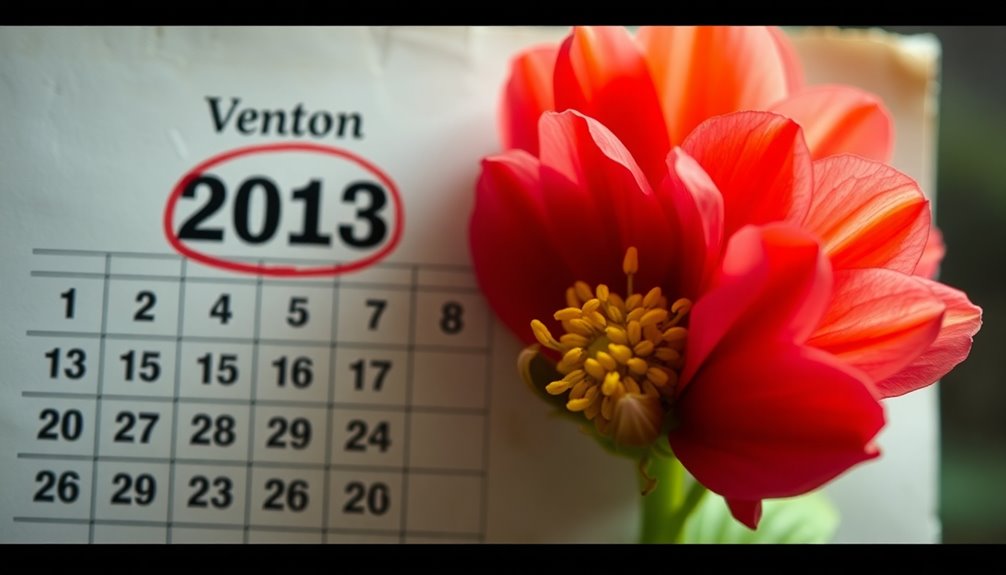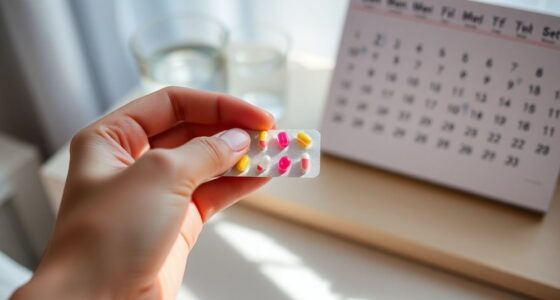Getting pregnant right before your period is unlikely, but it's not impossible. Ovulation usually happens two weeks before your next period, making the chances slim. However, sperm can survive up to five days in your body, so if you ovulate soon after your period, there might be a window for conception. Understanding your cycle and timing is essential for evaluating any risks. If you're curious about how to track your fertile window better, there's more to uncover.
Key Takeaways
- Pregnancy chances right before your period are generally low due to ovulation occurring about two weeks prior.
- Sperm can survive up to five days, allowing for potential conception if ovulation happens soon after unprotected intercourse.
- Irregular cycles can complicate understanding of ovulation timing, increasing the risk of unexpected fertility windows.
- Light bleeding or spotting may be mistaken for a period, affecting fertile window calculations.
- Tracking your menstrual cycle and ovulation can enhance fertility awareness and improve conception chances.
Understanding Your Menstrual Cycle
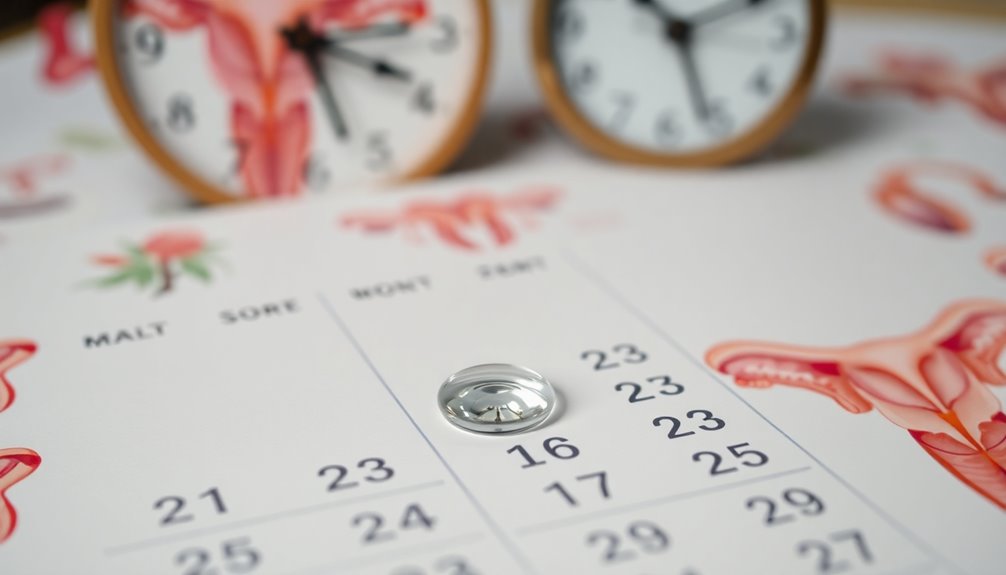
Understanding your menstrual cycle is essential for recognizing your fertile days and planning for pregnancy or contraception. The average cycle lasts about 28 days, with ovulation generally occurring around 14 days before your next period.
Your fertile window spans about five to six days leading up to and including ovulation, when an egg is released. Hormonal changes triggered by follicle-stimulating hormone (FSH) around days 6 to 14 help facilitate this process, allowing for conception if sperm is present.
If you have irregular cycles, predicting ovulation can be tricky, but tracking your cycle patterns can enhance fertility awareness. By understanding your cycle, you can better identify your fertile days, increasing the chances of pregnancy or avoiding unintended pregnancies.
Can You Get Pregnant Right Before Your Period?
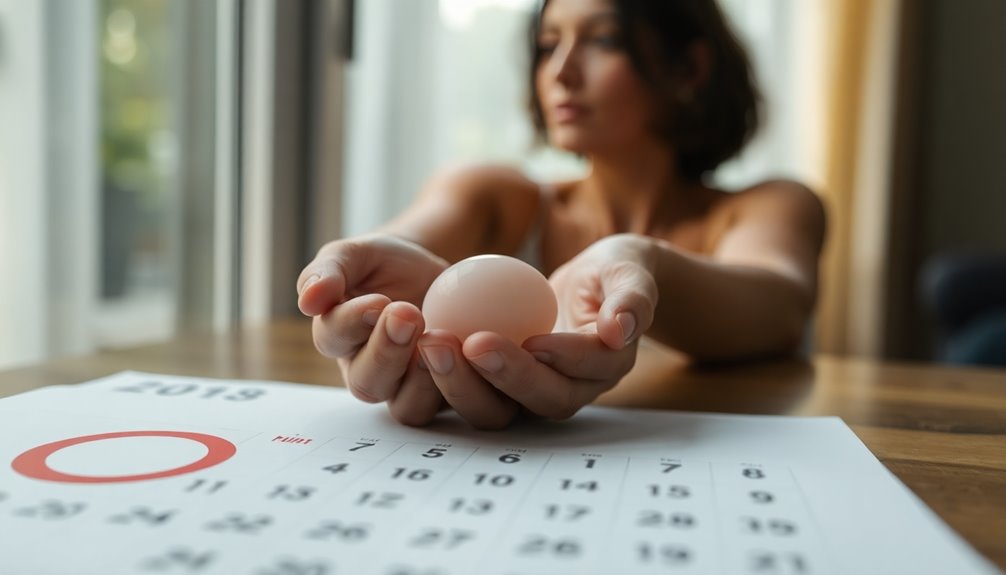
You might wonder if you can get pregnant right before your period.
While ovulation usually happens about two weeks earlier, irregular cycles and sperm viability can create some uncertainty.
Understanding these factors can help clarify your risks during this time.
Ovulation Timing Explained
While the chances of getting pregnant right before your period are generally low, it's important to reflect on how ovulation timing can influence your fertility.
Ovulation typically occurs about two weeks before your menstrual cycle begins, which means the egg's viability diminishes considerably by then. Sperm survival can last up to five days, but without a viable egg, conception is unlikely.
If you have irregular cycles or are approaching perimenopause, ovulation might happen later than expected, increasing the likelihood of pregnancy risk. Additionally, shorter cycles can lead to ovulation soon after your period, heightening the risk if you engage in intercourse right before menstruation.
Tracking your cycles can help clarify your fertility window and reduce uncertainty regarding conception chances.
Sperm Viability Factors
Although the chances of getting pregnant right before your period are generally low, several factors can influence sperm viability and the overall risk of conception. Sperm can survive up to five days, so if you have an irregular cycle or shorter menstrual cycle, ovulation might occur soon after your menstruation ends, increasing the chances of getting pregnant.
| Factor | Description | Impact on Pregnancy |
|---|---|---|
| Sperm Viability | Survival up to 5 days | Increases conception risk |
| Menstrual Cycle Length | Shorter cycles lead to closer ovulation | Higher pregnancy chance |
| Irregular Cycles | Unpredictable ovulation | Misunderstand fertile window |
| Unprotected Sex | Engaging without protection | Increases pregnancy risk |
| Fertility | Overall health affects conception | Influences chances |
Cycle Regularity Impact
Understanding sperm viability factors sheds light on the complexities of conception, especially concerning cycle regularity.
The likelihood of getting pregnant right before your period is generally low since ovulation typically occurs about two weeks prior to menstruation. If you have regular cycles, engaging in unprotected sex the day before your period usually won't lead to conception, as there's no viable egg.
However, if your cycle is irregular, ovulation might happen later than expected, slightly increasing the chances of pregnancy. Additionally, women with shorter cycles may ovulate closer to their cycle's end, raising the risk of becoming pregnant if intercourse occurs shortly before menstruation.
In such cases, it's essential to be aware of your fertile window.
The Role of Sperm Viability in Conception
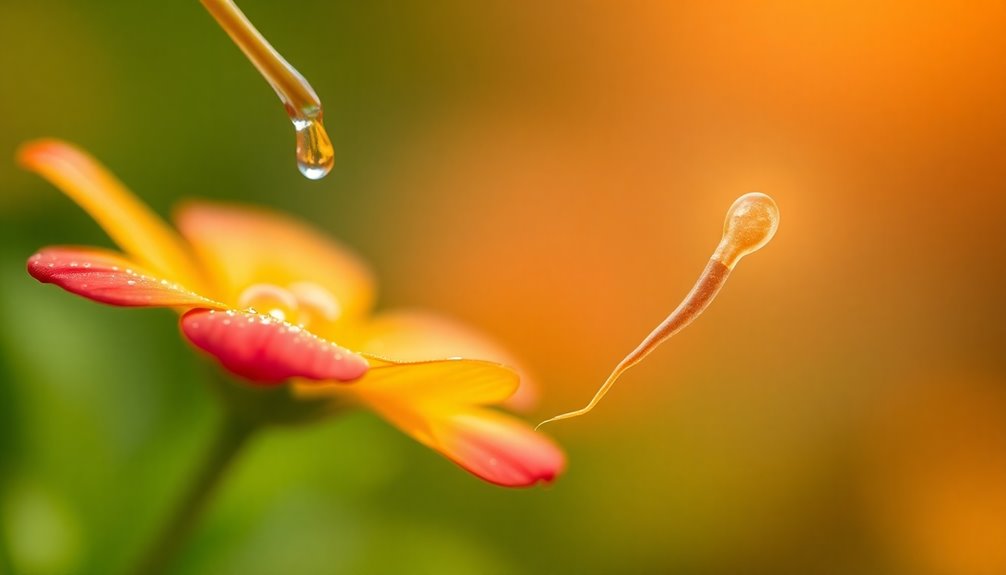
Understanding sperm viability is key to grasping how conception can happen.
Sperm can live up to five days inside your body, which means if you have unprotected sex just before your period, you could still get pregnant if you ovulate earlier than expected.
Factors like cervical mucus also play a role in how long sperm can survive, impacting your fertility window.
Sperm Lifespan Explained
When you're trying to conceive, knowing how long sperm can survive in the female reproductive tract is essential.
Sperm lifespan can extend up to five days, which means if you have unprotected sex during your fertile window, conception is possible if ovulation occurs shortly after.
The viability of sperm peaks around ovulation, making the days leading up to it vital for timing intercourse.
Even if you engage in intercourse just before your period, there's still a chance of pregnancy, especially in short menstrual cycles where ovulation may occur soon after.
Understanding sperm lifespan helps you track fertility more effectively, ensuring you maximize your chances of conception based on your menstrual cycle and timing of intercourse.
Timing and Fertility Window
Knowing the timing of your fertile window can greatly impact your chances of conception. This window typically lasts about five to six days each month, with the highest likelihood of getting pregnant in the days leading up to and including ovulation.
Sperm survival plays an essential role here; sperm can live up to five days in your reproductive tract. If you have a shorter menstrual cycle, ovulation could happen soon after your period ends, increasing your chances of conception shortly after menstruation.
However, if your cycles are irregular, understanding your individual cycle lengths becomes important in predicting ovulation and optimizing your conception likelihood.
Timing is everything, so track your cycles carefully to enhance your chances.
Factors Influencing Viability
While many factors influence your chances of conception, sperm viability plays an essential role in determining whether fertilization occurs.
Sperm can survive in your reproductive tract for up to five days, so if you have sexual intercourse just before ovulation, there's a good chance of pregnancy. The days leading up to ovulation are critical during your menstrual cycle, especially if ovulation occurs soon after menstruation.
Irregular cycles, stress, and health issues can affect your ovulation timing, making it possible to conceive even right before your period.
Getting Pregnant During Your Period
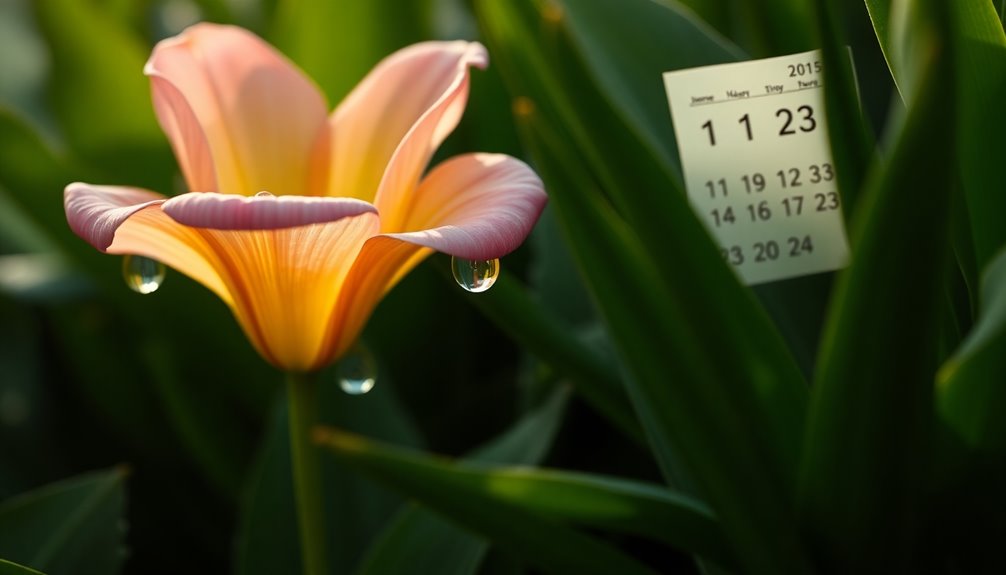
Though many believe that getting pregnant during your period is unlikely, it's important to understand that it's still possible. Here are some key points to take into account:
Understanding that pregnancy during your period is possible is crucial for effective family planning.
- Sperm Survival: Sperm can survive in your body for up to five days; unprotected sex late in your period could lead to a pregnancy if ovulation occurs soon after.
- Short Cycles: Women with shorter menstrual cycles may ovulate shortly after their period, increasing the chance of getting pregnant.
- Irregular Cycles: If you have irregular cycles, ovulation timing can be unpredictable, raising the likelihood of conception during your period.
- Spotting Confusion: Light bleeding or spotting might be mistaken for a period, complicating ovulation calculations and increasing pregnancy risk.
Stay informed to better navigate your fertile window!
What Happens Right After Your Period?
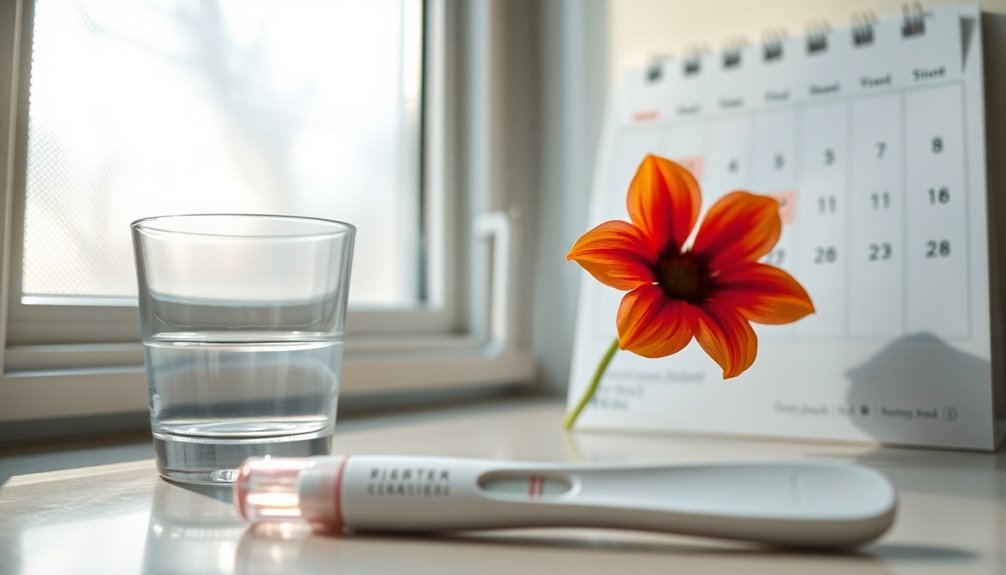
After your period ends, your body begins to prepare for the next ovulation cycle, which can greatly influence your chances of getting pregnant.
If you have a shorter menstrual cycle, ovulation might occur within a week after your period. This means that having sex right after your period can still lead to pregnancy, especially since sperm can live in your reproductive tract for up to five days.
The fertile window starts about five days before ovulation, so timing is essential when you're trying to conceive.
Tracking your cycle length helps you identify those important days after your period, maximizing your chances of getting pregnant right when you're most fertile.
Stay aware of your body's rhythms!
Can You Conceive on the First Day of Your Period?
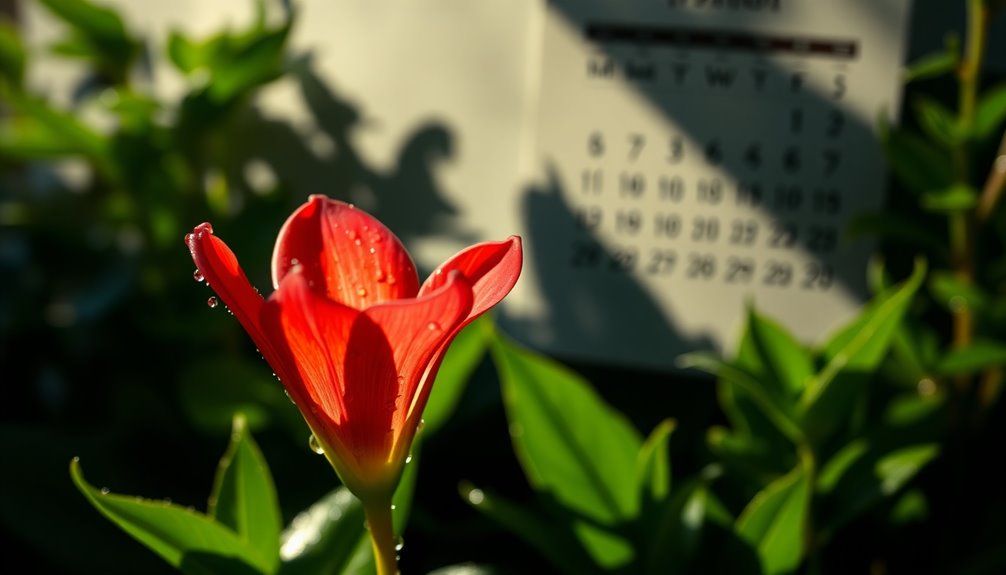
Can you really conceive on the first day of your period? While it's highly unlikely, it's still possible under certain circumstances. If you have shorter menstrual cycles, premature ovulation could lead to conception.
Here are some key points to reflect on:
- Sperm Survival: Sperm can live for up to five days in your reproductive tract.
- Irregular Cycles: If your cycles are irregular, predicting ovulation can be tricky.
- Light Spotting: Sometimes, light spotting may be mistaken for a period, complicating fertility timing.
- Understanding Cycle Patterns: Knowing your cycle patterns can help assess the likelihood of conception.
Additionally, establishing clear goals for understanding your menstrual cycle can aid in better fertility tracking.
Factors That Influence Ovulation Timing

Understanding the factors that influence ovulation timing is essential for anyone trying to conceive. Your menstrual cycle length, typically around 28 days, can vary from 21 to 35 days, affecting ovulation.
Stress, diet, and overall health can disrupt hormonal balance, leading to irregular cycles and unpredictable ovulation patterns. Conditions like polycystic ovary syndrome (PCOS) or thyroid disorders further complicate this. Significant weight changes or intense exercise may also alter your cycle.
To pinpoint your fertility window, consider tracking your basal body temperature and using ovulation predictor kits. These tools help you understand your unique ovulation timing, improving your chances of pregnancy.
Key Takeaways for Conception Awareness
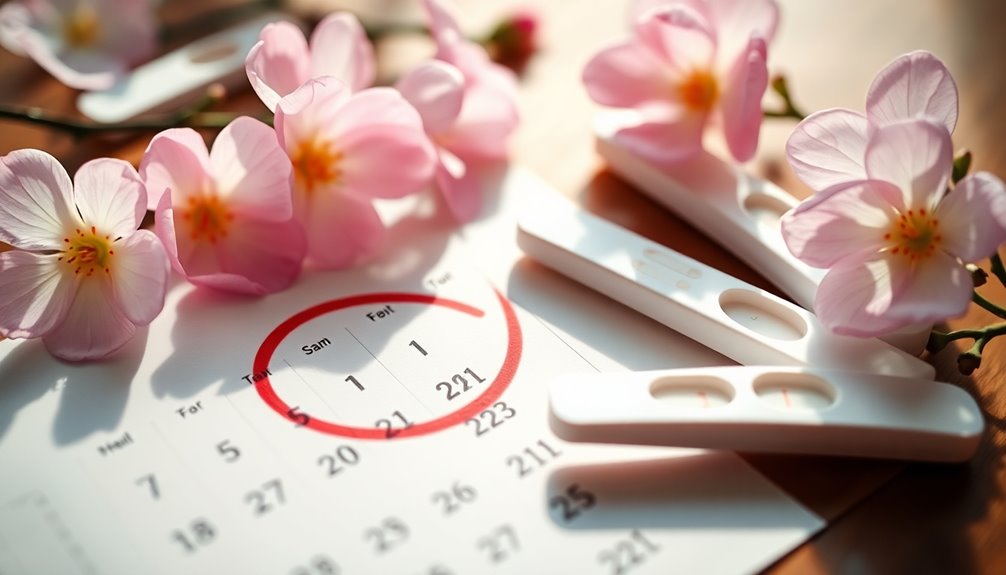
When you're trying to conceive, being aware of your menstrual cycle and its nuances can greatly impact your efforts.
Here are some key takeaways for conception awareness:
- Understand Your Cycle: Recognize your average menstrual cycle length and identify your fertile window.
- Monitor Ovulation: Use ovulation tracking methods to pinpoint when you're most likely to conceive.
- Consider Sperm Survival: Remember that sperm can survive up to five days, so timing unprotected sex around ovulation is essential.
- Account for Irregular Cycles: If you have irregular cycles, stay extra aware of potential ovulation changes, as this can affect your likelihood of getting pregnant.
Being informed about these factors can enhance your chances of conception and help you make better reproductive choices.
Frequently Asked Questions
Can You Find Out if Your Pregnant Before Your Period?
You can't definitively find out if you're pregnant before your period is due.
While some early pregnancy symptoms might show up, they're often similar to PMS. Home pregnancy tests are most accurate on the first day of a missed period, as that's when hCG levels are high enough to detect.
If your cycle's irregular, it might take longer to confirm pregnancy, so consulting a healthcare provider can help clarify your situation.
Can I Get Pregnant a Day Before My Period and Still See My Period?
You can get pregnant a day before your period, but it's unlikely.
If you have a regular cycle, ovulation usually happens about two weeks earlier, meaning the egg's lifespan is short. While sperm can survive for several days, the timing makes conception improbable right before menstruation.
However, if you have an irregular cycle, it complicates things, and there's a rare chance you could conceive.
Still, most women won't get pregnant just before their period.
Can You Confirm Pregnancy at 1 Week?
You can't reliably confirm pregnancy just one week after a missed period.
It's best to wait at least a week after your missed period to take a home pregnancy test for accurate results.
If your cycles are irregular, you might need to wait one to two weeks after intercourse for detectable hCG levels.
If you're unsure about the results, retest a few days later or consult your healthcare provider for guidance.
Is It Possible to Know Pregnancy Before Your Period?
You might find yourself wondering if you can sense a little miracle before your period arrives.
While early signs like spotting or cramping could hint at something special, they often mimic premenstrual symptoms, making it tricky to tell.
Home pregnancy tests shine brightest on the first day of a missed period, but waiting a week enhances accuracy.
If your cycles are irregular, give it a few weeks post-encounter for a clearer picture.
Conclusion
To summarize, while it might seem unlikely to get pregnant just before your period, it's important to remember that every cycle is unique. You might be surprised to learn that sperm can live for several days, making conception possible even when you think you're safe. Don't let misconceptions hold you back from understanding your body. Embrace the knowledge that could change your life—because every moment counts when it comes to planning your future.
